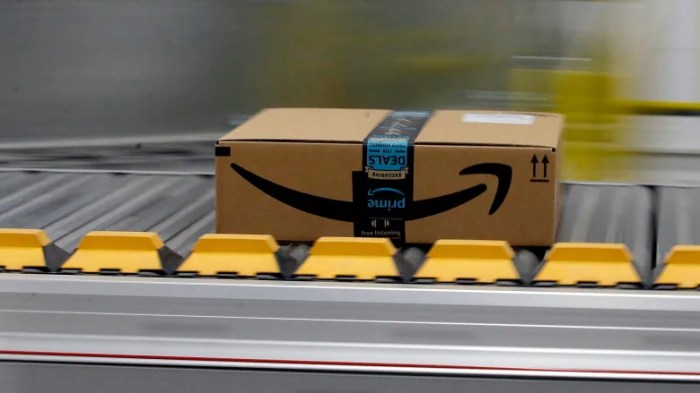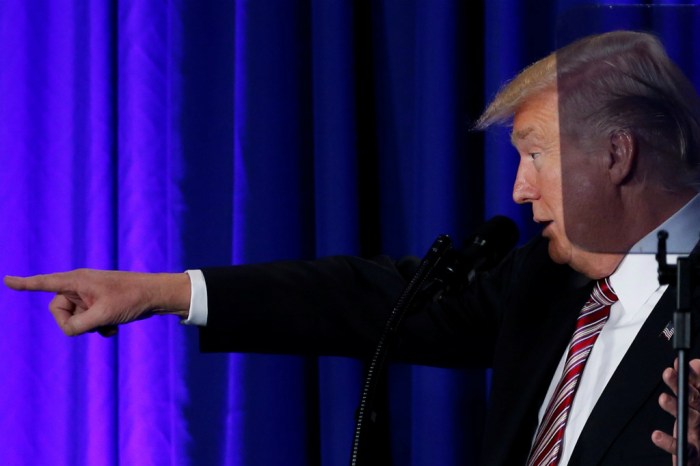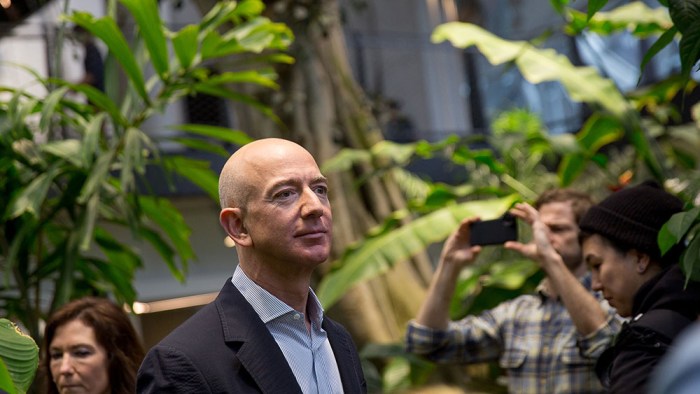President Trump reportedly obsessed with going after Amazon—the statement itself is a headline-grabber. But beyond the sensationalism lies a complex story of political maneuvering, corporate clashes, and the unpredictable power of a tweet. This deep dive explores Trump’s relentless attacks on the retail giant, examining the motivations behind his actions, Amazon’s responses, and the far-reaching consequences across various industries.
From public pronouncements to potential legal ramifications, we’ll unpack the multifaceted saga of Trump versus Amazon, delving into the political calculations, the media’s role in shaping public perception, and the ripple effects felt across the retail, logistics, and tech landscapes. We’ll dissect the specific criticisms levied against Amazon—from antitrust concerns to its impact on brick-and-mortar stores—and analyze how these accusations played out in the real world. Get ready for a rollercoaster ride through one of the most intriguing business-politics dramas of recent times.
Trump’s Public Statements Regarding Amazon: President Trump Reportedly Obsessed With Going After Amazon
President Donald Trump’s relationship with Amazon was, to put it mildly, contentious. His frequent and highly publicized criticisms spanned several years, fueled by a complex mix of political ideology, personal grievances, and perceived economic threats. These statements, often delivered via Twitter or during public speeches, significantly impacted the narrative surrounding Amazon and its business practices.
Timeline of Trump’s Public Criticisms of Amazon
The following table details a selection of President Trump’s public statements targeting Amazon, highlighting the specific criticisms and the context in which they were made. It’s important to note that this is not an exhaustive list, but rather a representative sample illustrating the frequency and nature of his attacks.
| Date | Statement Type | Target | Context |
|---|---|---|---|
| March 2016 | Tweet | Amazon’s tax practices | During the 2016 presidential campaign. Trump claimed Amazon was avoiding taxes. |
| December 2017 | Tweet | Amazon’s impact on brick-and-mortar stores | Trump expressed concern about the negative impact of Amazon’s growth on traditional retail businesses. |
| March 2018 | Tweet | Amazon’s use of the US Postal Service | Trump accused Amazon of exploiting the USPS, suggesting they were not paying enough for shipping. |
| March 2019 | Speech | Amazon’s antitrust concerns | During a speech, Trump hinted at potential antitrust investigations into Amazon’s business practices. |
| July 2019 | Tweet | Amazon’s dominance in the online retail market | Trump reiterated concerns about Amazon’s market power and its potential negative effects on competition. |
| October 2019 | Interview | Amazon’s tax practices and impact on retailers | In an interview, Trump again criticized Amazon’s tax strategies and its role in the decline of brick-and-mortar stores. |
Specific Criticisms Leveled Against Amazon
Trump’s criticisms of Amazon were multifaceted. They consistently revolved around three main areas: taxation, its impact on traditional retail, and its alleged monopolistic practices. He frequently asserted that Amazon was not paying its fair share of taxes, a claim often debated and investigated but never definitively proven to the extent he suggested. Furthermore, he repeatedly linked Amazon’s growth to the decline of brick-and-mortar stores, framing it as a negative economic consequence. Finally, his rhetoric often hinted at antitrust concerns, suggesting Amazon’s size and market dominance posed a threat to fair competition. These criticisms, often delivered with inflammatory language, shaped public perception of Amazon and contributed to the ongoing debate surrounding its business practices and regulatory oversight.
Potential Motivations Behind Trump’s Stance
Donald Trump’s repeated attacks on Amazon, culminating in frequent public pronouncements and behind-the-scenes pressure, weren’t simply random outbursts. A complex interplay of personal grievances, political strategy, and populist appeal fueled his intense focus on the e-commerce giant. Understanding these motivations provides crucial context for interpreting his actions and their impact.
The animosity between Trump and Amazon CEO Jeff Bezos is well-documented. Beyond the simple rivalry of powerful business figures, the relationship is complicated by Bezos’ ownership of the Washington Post, a newspaper frequently critical of Trump and his administration. This journalistic scrutiny likely contributed significantly to Trump’s negative perception of Amazon, transforming a business dispute into a personal vendetta. The perceived slight to his persona and political standing through critical reporting likely amplified his existing business-related concerns.
The Role of Populist Rhetoric
Trump’s criticism of Amazon skillfully employed populist rhetoric, a key element of his political brand. By portraying Amazon as a monolithic corporation that unfairly dominates the retail landscape, harming small businesses and costing jobs, he tapped into anxieties felt by many Americans regarding economic inequality and the perceived power of big tech. This narrative resonated with his base, who often viewed large corporations with suspicion, further solidifying his support among this demographic. The attacks on Amazon served as a symbolic battle against the perceived evils of unchecked corporate power, a message that effectively galvanized his supporters.
Comparison with Trump’s Stances on Other Large Corporations
While Trump frequently targeted Amazon, his approach to other large corporations was often inconsistent. While he voiced criticism of certain companies at times, his actions and pronouncements lacked the consistent intensity and personal animus displayed towards Amazon. For example, while he expressed concerns about the power of other tech giants, he also engaged in positive interactions with their CEOs and even praised their contributions to the economy. This inconsistency highlights that the Amazon conflict was unique, driven more by personal factors and the role of the Washington Post than by a broader, consistent policy against large corporations. The selective nature of his criticism underscores the personal element at play.
Amazon’s Response and Impact
Amazon, a behemoth known for its quiet efficiency, didn’t exactly shy away from the Trump administration’s public criticisms, but its responses were characteristically measured and strategic. Instead of engaging in a tit-for-tat battle of press releases, Amazon focused on demonstrating its economic contributions and emphasizing its adherence to legal and regulatory frameworks. This approach, while less dramatic than a full-blown public confrontation, proved surprisingly effective in navigating the turbulent political waters.
The impact of Trump’s statements on Amazon’s stock price was, unsurprisingly, complex. While some initial dips occurred following particularly harsh pronouncements, Amazon’s stock ultimately demonstrated remarkable resilience. This resilience can be attributed to a variety of factors, including Amazon’s robust business model, its continued growth across multiple sectors, and the overall strength of the technology market. It’s worth noting that while short-term fluctuations were observed, the long-term trajectory of Amazon’s stock price largely remained unaffected by Trump’s rhetoric.
Amazon’s Public Statements and Actions, President trump reportedly obsessed with going after amazon
Amazon’s public responses to Trump’s criticisms generally focused on highlighting the company’s positive economic impact. Rather than directly refuting Trump’s claims, Amazon emphasized job creation, investment in infrastructure, and its contributions to local communities. This strategy subtly countered the narrative of Amazon as a tax-evading, job-killing monopoly. The company also consistently emphasized its compliance with all applicable laws and regulations, indirectly addressing concerns about antitrust issues and unfair competition.
Impact on Amazon’s Stock Price and Market Performance
While Trump’s criticisms did cause temporary fluctuations in Amazon’s stock price, the overall impact was relatively minor in the long run. For example, a sharp drop might have been seen immediately following a particularly aggressive tweet from the President, but these dips were often short-lived, and the stock quickly recovered. This resilience underscored investor confidence in Amazon’s fundamental strength and future growth prospects. In fact, Amazon continued to expand its market share and revenue throughout this period, showcasing its ability to weather political storms. The long-term trend remained upward, indicating that the market largely discounted the political noise.
Specific Actions Taken by Amazon
The following actions illustrate Amazon’s proactive response to the perceived threat posed by Trump’s criticisms:
- Increased investment in logistics and infrastructure: Amazon accelerated its investments in fulfillment centers, delivery networks, and other infrastructure projects, further solidifying its position and showcasing its commitment to job creation and economic growth.
- Strengthened community engagement initiatives: Amazon increased its philanthropic activities and community investment programs, demonstrating its commitment to social responsibility and mitigating negative perceptions.
- Enhanced lobbying efforts: The company likely intensified its lobbying efforts to influence policy discussions and counter any potentially harmful legislation. While specifics remain confidential, it’s reasonable to assume a heightened focus on maintaining positive relationships with key lawmakers.
- Focused on showcasing positive news: Amazon likely prioritized disseminating positive news about its operations, including job creation announcements and positive community impact stories, to counter negative media narratives.
The Role of Media Coverage
The media played a significant role in shaping public perception of Donald Trump’s reported obsession with Amazon. News outlets, with varying degrees of political leaning, covered the story extensively, influencing how the public understood Trump’s actions and their potential consequences. The tone and framing employed by different news organizations significantly impacted the narrative.
News outlets like the New York Times, The Wall Street Journal, and CNN provided detailed accounts of Trump’s public statements, tweets, and reported internal discussions concerning Amazon. These reports often highlighted the potential conflict of interest between Trump’s personal business dealings and his official duties, as well as the potential negative impact of his actions on the broader economy and the tech sector. The tone in these publications generally leaned towards critical analysis, questioning the rationale behind Trump’s stance and highlighting potential negative repercussions. Fox News, on the other hand, often presented a more sympathetic view, framing Trump’s actions as a necessary response to Amazon’s perceived dominance and its impact on smaller businesses. The difference in framing between these outlets contributed to a polarized public discourse.
News Outlets’ Perspectives on Trump’s Actions and Their Potential Effects
The following table provides a comparative analysis of different news outlets’ perspectives on Trump’s reported actions regarding Amazon and their potential effects. Note that these represent general tendencies and individual articles may deviate.
| News Outlet | Perspective on Trump’s Actions | Potential Effects (as presented by the outlet) | Overall Tone |
|---|---|---|---|
| New York Times | Critical, highlighting potential conflicts of interest and abuse of power. | Negative impacts on competition, economic inequality, and free market principles. | Negative, investigative |
| The Wall Street Journal | Mixed, acknowledging concerns while also considering potential justifications. | Both positive and negative economic consequences depending on the specific actions taken. | Analytical, balanced (though often leaning slightly conservative) |
| CNN | Generally critical, emphasizing the potential for regulatory overreach and unfair targeting. | Negative impacts on consumers, innovation, and the tech industry. | Negative, critical |
| Fox News | More supportive, often portraying Trump’s actions as a necessary response to Amazon’s dominance. | Positive effects on smaller businesses and a fairer market. Downplays negative economic consequences. | Positive, supportive |
Media coverage, therefore, significantly amplified and shaped public perception of the issue. The differing perspectives presented by various news outlets contributed to a fragmented and often polarized public discourse, making it challenging for individuals to form a complete and unbiased understanding of the complex interplay between the Trump administration and Amazon. The extent to which public opinion was influenced by media framing remains a subject of ongoing debate and research.
Legal and Regulatory Ramifications

Source: cbc.ca
President Trump’s reported obsession with Amazon? It’s a whole other level of retail disruption. Think about it: the sheer audacity of ford car vending machine Alibaba – that’s next-level e-commerce. Maybe Trump should focus on innovating instead of just tweeting about Amazon; the future of retail is definitely not about yesterday’s grudges.
While Trump’s public pronouncements against Amazon often lacked specific legal grounding, his administration’s actions did create a climate of regulatory scrutiny that impacted the tech giant. This scrutiny, fueled by Trump’s rhetoric, intersected with existing antitrust concerns and led to several investigations and policy shifts. The extent to which these actions were directly caused by Trump’s statements remains a subject of debate, but the correlation is undeniable.
The period coinciding with Trump’s presidency saw a heightened focus on antitrust enforcement across various sectors, including tech. This heightened scrutiny wasn’t solely directed at Amazon, but the company, given its dominant market position, became a focal point. The investigation’s outcomes and the resulting policies influenced Amazon’s operations and strategic decisions.
Antitrust Investigations and Scrutiny
The Trump administration’s Department of Justice (DOJ) and Federal Trade Commission (FTC) initiated several investigations into Amazon’s business practices. These probes examined areas such as its treatment of third-party sellers on its platform, potential anti-competitive behavior in its cloud computing division (Amazon Web Services or AWS), and its use of data collected from consumers. While none resulted in major legal setbacks for Amazon during Trump’s term, the investigations themselves generated negative publicity and consumed significant resources for the company, forcing them to allocate time and money to defense rather than expansion or innovation. The investigations served as a clear example of how political rhetoric could translate into tangible regulatory pressure, even without immediate legal repercussions.
Changes in Antitrust Policy
While no sweeping changes to antitrust law were enacted during the Trump administration specifically targeting Amazon, there was a noticeable shift in enforcement priorities. The administration emphasized a more aggressive approach to antitrust enforcement, particularly against large tech companies. This change in tone and focus, arguably influenced by Trump’s public criticisms, created an environment where regulatory agencies felt greater pressure to scrutinize companies like Amazon. This climate of heightened scrutiny, regardless of specific legislative changes, had a chilling effect on Amazon’s operations and strategic planning.
Connection Between Trump’s Rhetoric and Regulatory Actions
The direct causal link between Trump’s statements and specific regulatory actions against Amazon is difficult to definitively prove. However, the timing and nature of the investigations, coupled with the administration’s overall approach to antitrust enforcement, suggest a strong correlation. Trump’s frequent and highly publicized attacks on Amazon likely contributed to a climate where regulatory agencies felt emboldened, or perhaps even pressured, to investigate the company more thoroughly. This demonstrates how presidential rhetoric, even if not directly translating into legislative changes, can significantly shape the regulatory landscape and impact corporate behavior. The sheer volume of Trump’s public criticism created a public perception that warranted investigation, even if the underlying legal justification remained ambiguous.
Illustrative Examples

Source: com.br
The Trump administration’s antagonistic stance towards Amazon sent ripples throughout various sectors, impacting not only direct competitors but also businesses reliant on Amazon’s infrastructure and services. Understanding these effects requires examining specific industries and the cascading consequences of this high-profile feud.
Retail Sector Impacts
Trump’s repeated criticisms of Amazon, often focusing on its alleged unfair tax practices and dominance in the retail landscape, fueled concerns among brick-and-mortar retailers already struggling with online competition. While it’s difficult to isolate the precise impact of Trump’s rhetoric from other market forces, the narrative likely contributed to a climate of uncertainty. Companies like Macy’s and JCPenney, already facing challenges, might have seen investor confidence slightly eroded amidst the heightened anti-Amazon sentiment. The perception of an uneven playing field, fueled by Trump’s pronouncements, could have indirectly hindered their efforts to compete more effectively.
Logistics and Delivery Industry Adjustments
Amazon’s massive logistics network, including its vast fleet of delivery vehicles and sophisticated fulfillment centers, represents a significant portion of the modern logistics industry. Trump’s actions, while not directly targeting this aspect of Amazon’s operations, indirectly affected related businesses. Smaller delivery companies, for instance, might have faced increased pressure to compete with Amazon’s scale and efficiency, a pressure amplified by the prevailing narrative of Amazon’s dominance. The potential for regulatory scrutiny, hinted at by Trump’s pronouncements, could have also impacted investment decisions in the logistics sector. Smaller players might have hesitated to expand, fearing increased regulatory hurdles.
Cloud Computing Sector Dynamics
Amazon Web Services (AWS), Amazon’s cloud computing arm, is a dominant player in the market. While Trump’s focus was primarily on Amazon’s retail operations, his general anti-Amazon stance might have subtly influenced the perception of AWS among some potential clients. While AWS’s market leadership remained largely unaffected, a lingering sense of uncertainty— fueled by the unpredictability of government policy under Trump—could have impacted the decision-making processes of some businesses considering migrating to the cloud or choosing between AWS and competitors like Microsoft Azure or Google Cloud. The perception of potential future regulatory challenges, even if not directly targeted at AWS, could have played a small role in these decisions.
Visual Representation of Ripple Effects
Imagine a target with Amazon at its center. The first ring outwards represents the direct competitors in retail (e.g., Walmart, Target, Best Buy) experiencing both increased and decreased pressures depending on their specific circumstances. The second ring encompasses logistics companies (e.g., FedEx, UPS) and smaller delivery services facing increased competition and uncertainty. The third ring represents the cloud computing sector, with AWS at the center and its competitors (Microsoft Azure, Google Cloud) experiencing a subtle shift in the competitive landscape due to the overall uncertainty surrounding Amazon. Finally, a fourth, outer ring represents the broader economy, experiencing the general impact of the shifting dynamics within these key sectors. This visual illustrates how Trump’s focus on one entity created a cascade of effects throughout interconnected industries.
Final Summary

Source: investors.com
The Trump-Amazon feud wasn’t just a clash between a president and a corporation; it was a microcosm of broader debates about corporate power, the role of government regulation, and the influence of social media in shaping public opinion. While the specifics of Trump’s motivations remain open to interpretation, the lasting impact on Amazon, its competitors, and the regulatory landscape is undeniable. This complex saga serves as a potent reminder of the interconnectedness of politics, business, and the media in the modern era, leaving us to ponder the long-term implications of such high-stakes power plays.